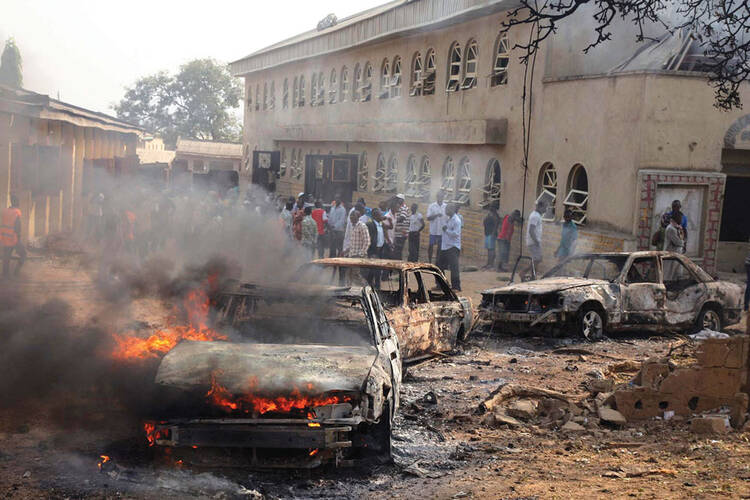President Goodluck Jonathan of Nigeria has promised an investigation after heavy fighting in Baga, a fishing village on the shores of Lake Chad in northeastern Nigeria, ended in the deaths of as many as 185 people, including many civilians. The Multinational Joint Task Force, a unit formed by soldiers from Nigeria, Chad, Niger and Cameroon, issued a much lower casualty report following an operation to clear out members of the Boko Haram, a Muslim sect that seeks to impose strict Islamic law. According to the commander of the task force, 30 Boko Haram militants and six civilians died in the fighting, but witnesses charged the death toll was much higher and that the military’s use of force was indiscriminate.
On April 24 President Jonathan established a committee to explore the possibility of amnesty for Boko Haram members, a move that suggests that military efforts to neutralize Boko Haram, blamed for the deaths of at least 1,400 people since 2010, are not going well. Supported by many who are tired of the fighting, the amnesty proposal has not been universally embraced in Nigeria, an oil-rich West African nation where Muslims dominate in the north and Christians in the south.
“Amnesty presupposes that the one you grant amnesty to is ready to show remorse for his actions and is ready for peace…[and] to stop all this carnage,” Dr. Moshood Fashola, president of Nigeria’s Ahmadiyya Muslim community, told local television. But with members of Boko Haram, “there is no such situation,” he said. In fact the insurgents issued a communiqué on April 11 rejecting amnesty talks.
Several Catholic bishops warned the Nigerian government to be wary of the consequences of granting amnesty to Boko Haram. Archbishop Felix Alaba Job of Ibadan, referring to Boko Haram’s targeting of civilians, questioned why the government should “grant amnesty to vandals of human souls and bodies.”
Retired Bishop Julius Babatunde Adelakun of Oyo said granting amnesty to Boko Haram would be “like granting amnesty to terrorists; it is unthinkable.” Bishop Adelakun alleged that government leaders in northern Nigeria know Boko Haram members and should become more involved in initiating dialogue and reconciliation. He said Nigerians should continue to pray that God “grant them a change of hearts; that is what they need.”
Bishop Felix Femi Ajakaye of Ekiti said that if the government grants amnesty to Boko Haram, other groups would ask for amnesty, too. He said suspects arrested in connection with Boko Haram’s bombing cases should be prosecuted to serve as a deterrent to others. He noted that Kabiru Sokoto, the Boko Haram leader alleged to have masterminded the Christmas bombing of St. Theresa Catholic Church in Madalla in 2011, has not been prosecuted.
Bishop Ajakaye also urged the Nigerian government to begin a dialogue with the leadership of the Movement for the Emancipation of the Niger Delta to build on the peace the southern part of the nation is currently enjoying. The movement’s officials threatened to resume destruction of crude oil installations in the Niger Delta following the jailing of their leader, Henry Okah, by a South African court.
Bishop Stephen Dami Mamza of Yola said that many residents in northern Nigeria now live in fear that Boko Haram could strike at any time. Church attendance is down, and many Christians have moved to other parts of the country to escape the threat. “We religious leaders are assuring them that their security is in the hands of God and [they] should not abandon God’s house,” he said.








